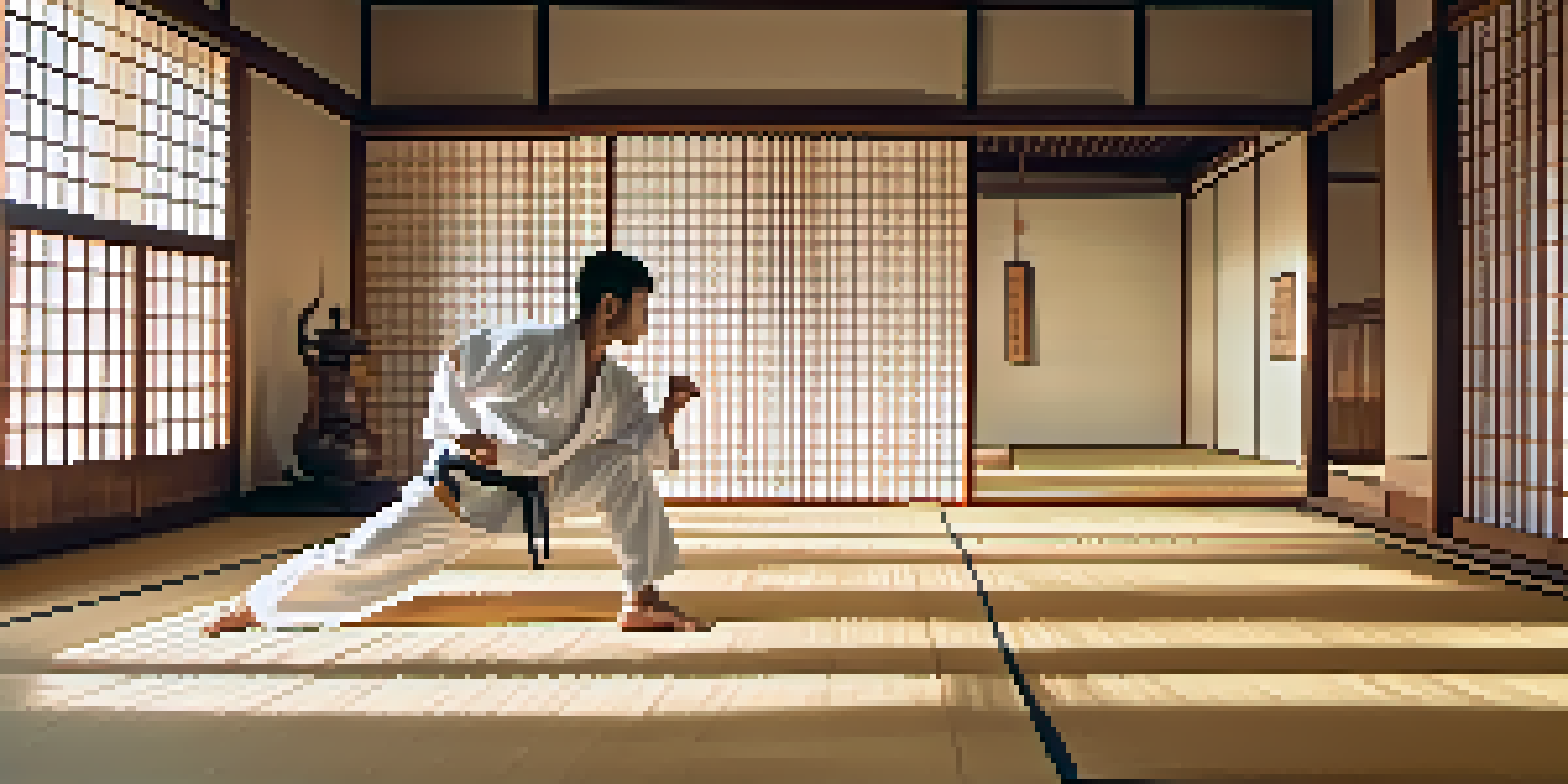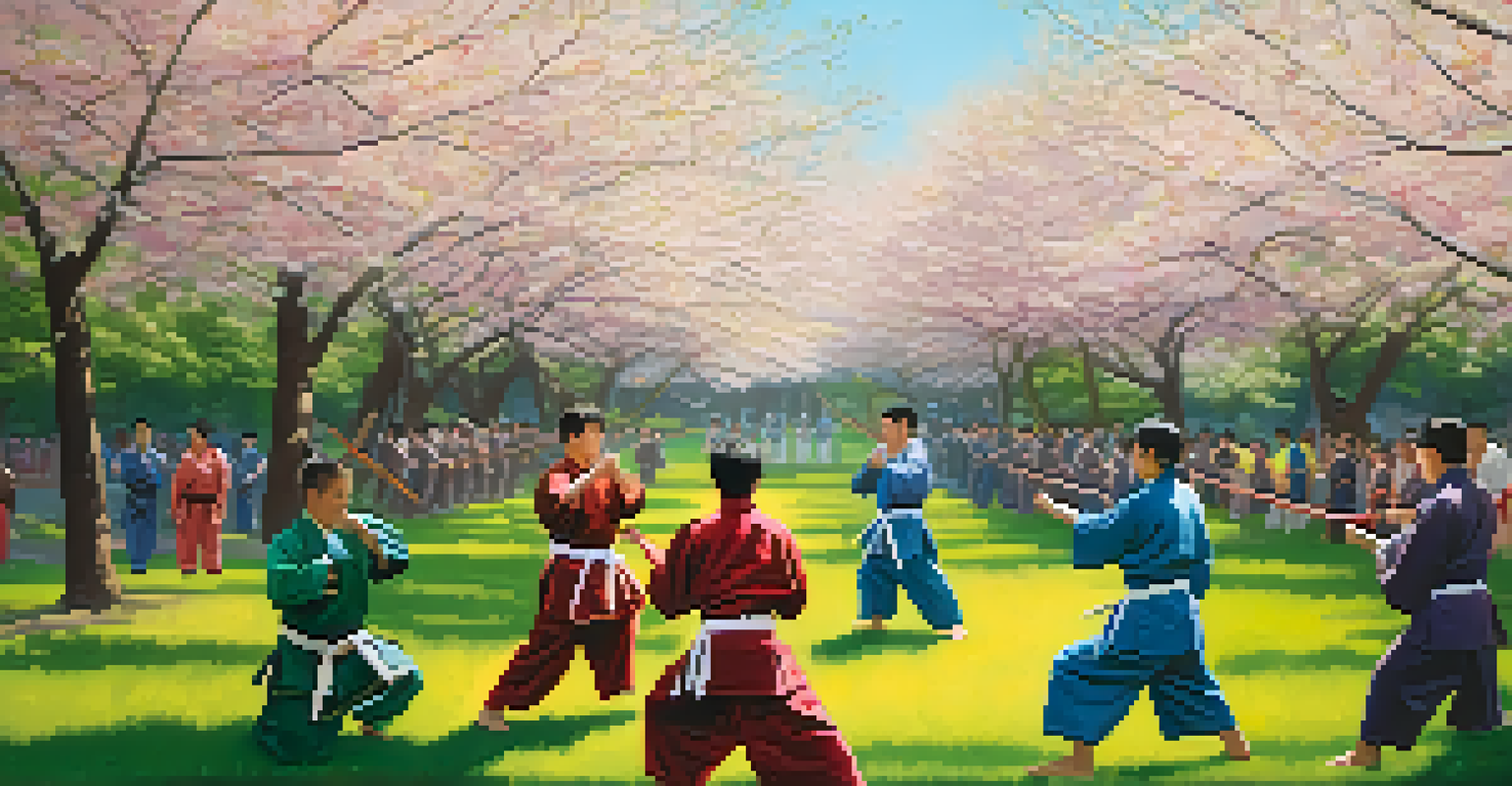The Psychological Benefits of Martial Arts in Conflict Resolution

Understanding Martial Arts and Its Philosophy
Martial arts is often seen as a physical discipline, but at its core, it embodies a profound philosophy. This philosophy emphasizes respect, discipline, and self-control, which are essential for personal development. By engaging in martial arts, individuals learn to channel their emotions and approach conflicts with a clear mind. This foundational understanding sets the stage for its psychological benefits in conflict resolution.
Martial arts is not about being better than someone else. It's about being better than you used to be.
The principles of martial arts encourage practitioners to reflect on their actions and reactions. This self-awareness is crucial when navigating conflicts, as it promotes thoughtful responses instead of impulsive reactions. Much like a chess game where each move is calculated, martial artists learn to assess situations before acting, leading to more constructive outcomes in disputes.
Moreover, martial arts fosters a sense of community and support among practitioners. This camaraderie builds social skills and emotional intelligence, which are vital for resolving conflicts amicably. When individuals feel part of a supportive group, they are more likely to approach disagreements with empathy and understanding.
Boosting Self-Confidence Through Martial Arts Training
One of the most significant psychological benefits of martial arts is the boost in self-confidence it provides. As students progress through different techniques and belt levels, they gain a sense of accomplishment. This newfound confidence transcends the dojo and spills into daily life, making individuals more assertive in their communication.

With improved self-esteem, martial artists are better equipped to handle conflicts. They feel empowered to express their thoughts and feelings without fear of confrontation. It’s similar to how a sturdy tree stands tall against the wind; confident individuals can withstand and navigate challenging interactions more effectively.
Martial Arts Builds Self-Confidence
Practicing martial arts empowers individuals by enhancing their self-esteem, enabling them to tackle conflicts more assertively.
Additionally, martial arts training teaches the importance of perseverance. When faced with challenges, practitioners learn to push through obstacles, which translates into real-life situations. This resilience is invaluable when dealing with conflicts, as it encourages individuals to seek resolution rather than avoidance.
Developing Emotional Regulation Skills in Martial Arts
Emotional regulation is a critical skill for effective conflict resolution, and martial arts training emphasizes this concept. Through rigorous practice, individuals learn to control their emotions, especially during high-stress situations. Just as a skilled archer maintains focus while aiming, martial artists become adept at managing their feelings amidst conflicts.
In martial arts, the mind is the ultimate weapon. The body is just a tool.
Breathing techniques and meditation are often incorporated into martial arts, further enhancing emotional control. Practitioners are taught to calm their minds and bodies, allowing them to respond rather than react. This mindful approach helps prevent escalations during disagreements, fostering a more peaceful resolution.
Moreover, as martial artists encounter physical challenges, they learn to cope with discomfort and frustration. This process of overcoming mental barriers builds resilience, enabling them to approach conflicts with a level-headed attitude. In essence, martial arts serves as a training ground for mastering emotional responses.
Enhancing Problem-Solving Skills Through Martial Arts
Martial arts is not just about physical strength; it also cultivates critical thinking skills. As practitioners learn various techniques, they must analyze situations and adapt their strategies accordingly. This analytical approach enhances their ability to assess conflicts and identify effective solutions.
Consider a martial artist facing an opponent with a different style; they must quickly evaluate their strengths and weaknesses. This adaptability translates directly to conflict resolution, where finding common ground and understanding different perspectives is crucial. Just like a puzzle, the ability to see the bigger picture helps in piecing together effective strategies for resolution.
Emotional Regulation is Key
Through martial arts training, practitioners develop essential emotional regulation skills that help them manage conflicts effectively.
Furthermore, martial arts encourages individuals to think outside the box. Practitioners often learn to anticipate their opponent's moves and devise counter-strategies. This creative problem-solving ability is essential in conflicts, allowing individuals to explore alternative solutions that might not be immediately obvious.
Building Respect and Empathy Through Martial Arts
Respect is a cornerstone of martial arts, taught from the very first lesson. Practitioners learn to respect their instructors, peers, and opponents, which fosters a culture of understanding and cooperation. This respect is crucial when resolving conflicts, as it encourages individuals to listen and consider different viewpoints.
Empathy, too, plays a vital role in martial arts training. As individuals practice with partners, they learn to recognize the physical and emotional limits of others. This understanding cultivates compassion, allowing practitioners to approach conflicts with a mindset geared towards resolution rather than aggression.
By nurturing respect and empathy, martial arts creates a foundation for healthier interactions. Just like a bridge connecting two shores, these values facilitate communication and understanding, paving the way for amicable conflict resolution.
Stress Relief and Its Role in Conflict Management
Martial arts provides an excellent outlet for stress relief, which is vital for effective conflict management. Engaging in physical activity releases endorphins, the body's natural mood lifters, and helps practitioners manage anxiety. This reduction in stress allows individuals to approach conflicts with a clearer and calmer mindset.
When stress levels are low, individuals are less likely to react defensively during disagreements. Instead, they can engage in constructive dialogues, much like a calm lake reflecting the sky rather than choppy waters that distort the view. This tranquility aids in finding common ground and resolving issues amicably.
Conflict Resolution Skills Grow
The principles learned in martial arts foster critical thinking and problem-solving abilities that are crucial for resolving disputes peacefully.
Furthermore, martial arts teaches coping mechanisms for dealing with stress. Techniques like controlled breathing and meditation become valuable tools for managing emotions in real-life conflicts. As practitioners learn to center themselves, they can navigate disputes with grace and composure.
The Lifelong Skills of Conflict Resolution Through Martial Arts
The skills acquired through martial arts training extend far beyond the dojo, offering lifelong benefits in conflict resolution. The self-discipline, emotional regulation, and respect learned through practice become ingrained in daily life. Practitioners often find that these qualities help them navigate both personal and professional relationships more effectively.
Much like a gardener cultivating a thriving garden, martial artists nurture their skills over time. As they grow in their practice, they become more adept at handling conflicts with maturity and insight. This cultivated skill set not only enhances their interactions but also positively impacts those around them.

Ultimately, martial arts equips individuals with the tools needed for peaceful conflict resolution. By fostering self-awareness, empathy, and problem-solving abilities, practitioners are better prepared to face life’s challenges. Just as the journey of a martial artist is ongoing, so too is the journey toward mastering conflict resolution.